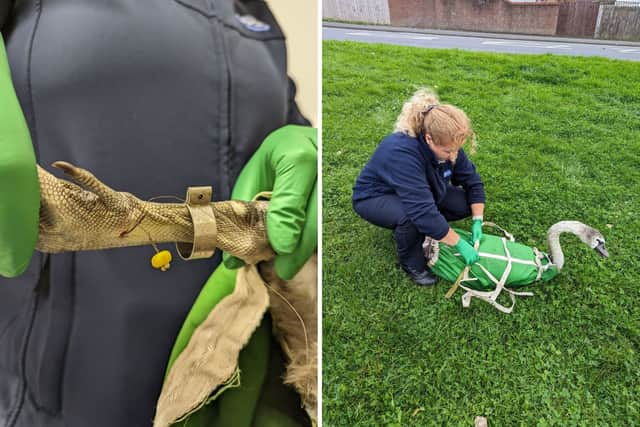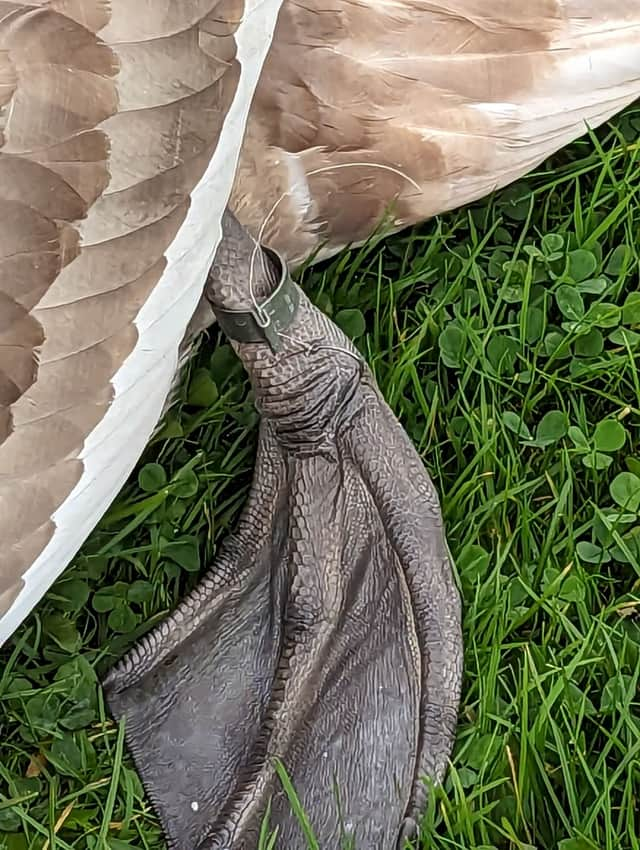Swans skewered by fishing hooks in Sunderland prompt RSPCA safety plea to fishing fans
and live on Freeview channel 276
Anglers are being urged to keep wildlife in mind after two young swans in Sunderland suffered injuries from discarded fishing hooks.
The injured cygnets - who are about seven months old and from a family of six - were reported to the RSPCA by concerned members of the public after they were seen at Silksworth Lake in Sunderland.
Advertisement
Hide AdAdvertisement
Hide AdBoth of them had hooks deeply embedded in their limbs which had left one of them unsteady and not able to walk properly.
RSPCA officers Lindsey Avery and Helen Nedley teamed up and managed to catch one of them which was taken to Westway Veterinary Group in Houghton.


The hook, which was removed, had caused a small hole in the young swan’s leg which thankfully wasn’t infected and he was successfully reunited with his family.
The second cygnet was caught by one of the inspectors three days later with assistance from a member of the public who regularly visits the area.
Advertisement
Hide AdAdvertisement
Hide AdThe bird was taken to Eden Hill Veterinary Surgery in West Pelton.
Again, the hook was successfully removed and the cygnet was re-released, although a slight swelling was noted by the vet and so the bird continues to be closely monitored.


The rescues, on September 28 and 30, come after the RSPCA revealed it had received 1,245 calls about fishing litter across England and Wales last year, with around half (614 or 49.3%) of these calls made between June and September.
Previous incidents involving discarded fishing litter at Silksworth Lake have been reported to the charity in the past.
Advertisement
Hide AdAdvertisement
Hide AdRSPCA chief inspector Lindsey Avery said: “Sadly we’re continuing to see an alarming number of animals who’ve been impacted by fishing litter.
"Many of them - like these cygnets - can be saved, but some need lengthy care and rehabilitation as a result.
"Others aren’t so lucky, and sometimes their injuries, or the sheer stress and exhaustion from their ordeal proves too much.

“It’s especially disheartening when there’s such a simple solution: clear up your litter - whether it’s fishing-related or general - and take it home with you.
Advertisement
Hide AdAdvertisement
Hide Ad"Many experienced anglers are responsible when it comes to wildlife and taking care of their equipment, but we’d urge those who may be new to the activity to be extra cautious about making sure they leave nothing behind.”
The RSPCA urges anglers to follow the Angling Trust’s Take 5 campaign and make use of the recycling scheme to dispose of waste tackle and line.
Best practice guidelines include:
● Take old fishing line and spools to recycling points in local tackle shops or fisheries. Your nearest recycling point can be found on the Anglers National Line Recycling Scheme (ANLRS) website. Alternatively, old fishing line can be posted to the address on the ANLRS page.
● Be aware of surrounding trees – discarded line caught in foliage causes problems for wildlife.
Advertisement
Hide AdAdvertisement
Hide Ad● Don’t leave bait unattended – always remove it from the hook and put it in a safe place.
● Use a reusable bait container. Don’t take bait in tins.
● Dispose of any litter you see, even if it’s not your own.
For further advice about what to do if you find an injured wild animal visit the RSPCA’s website or watch our video.
Comment Guidelines
National World encourages reader discussion on our stories. User feedback, insights and back-and-forth exchanges add a rich layer of context to reporting. Please review our Community Guidelines before commenting.